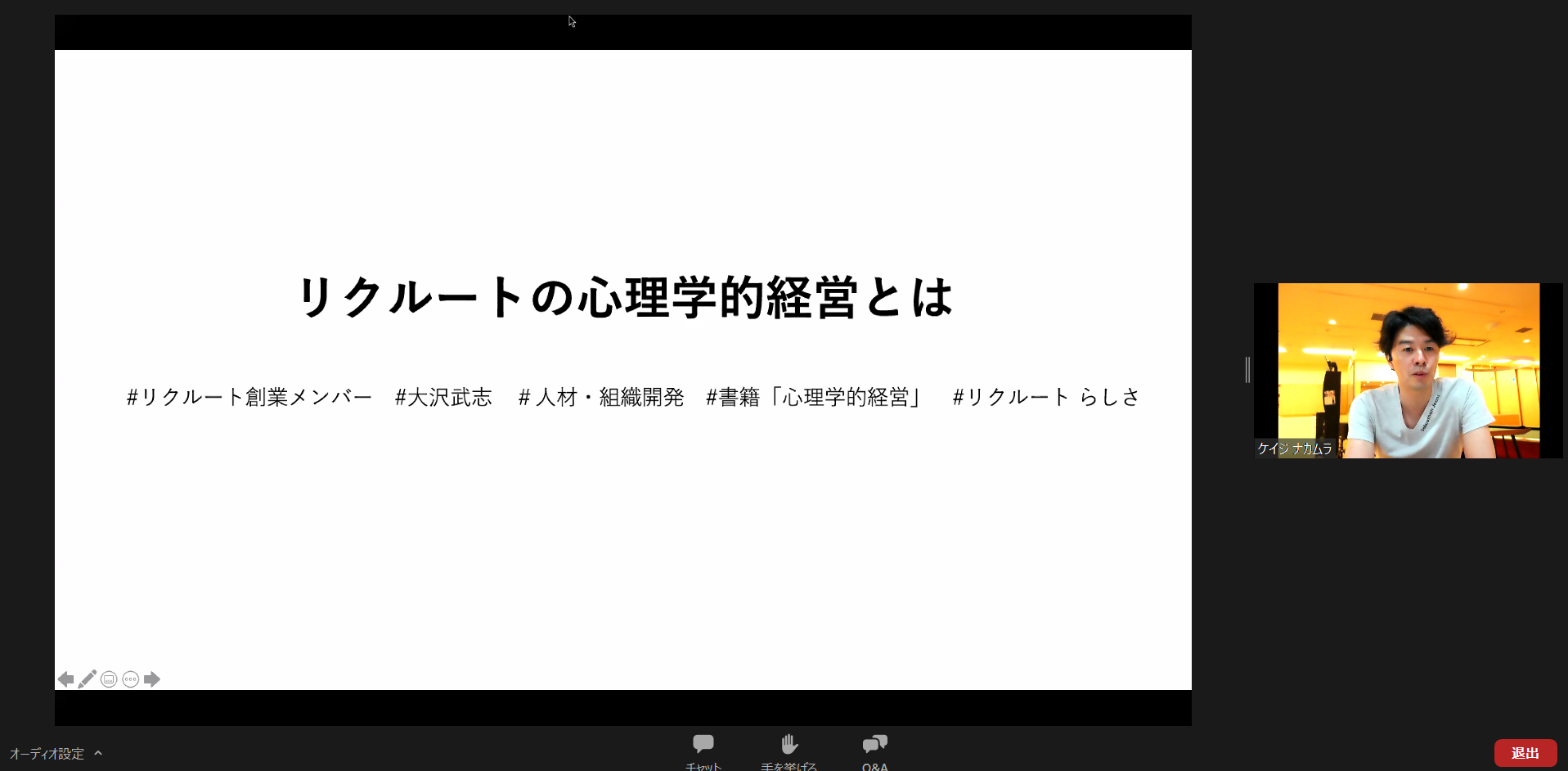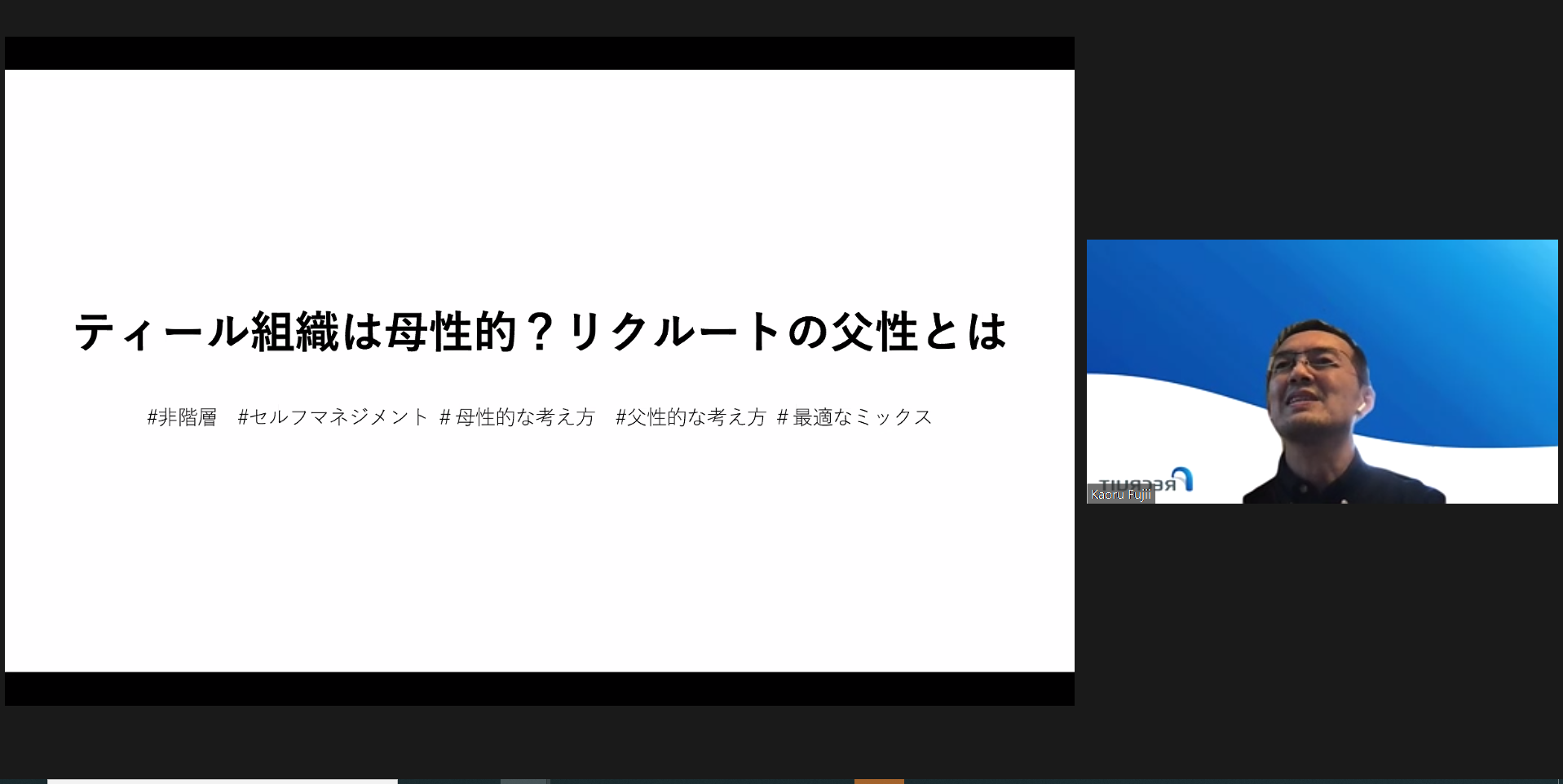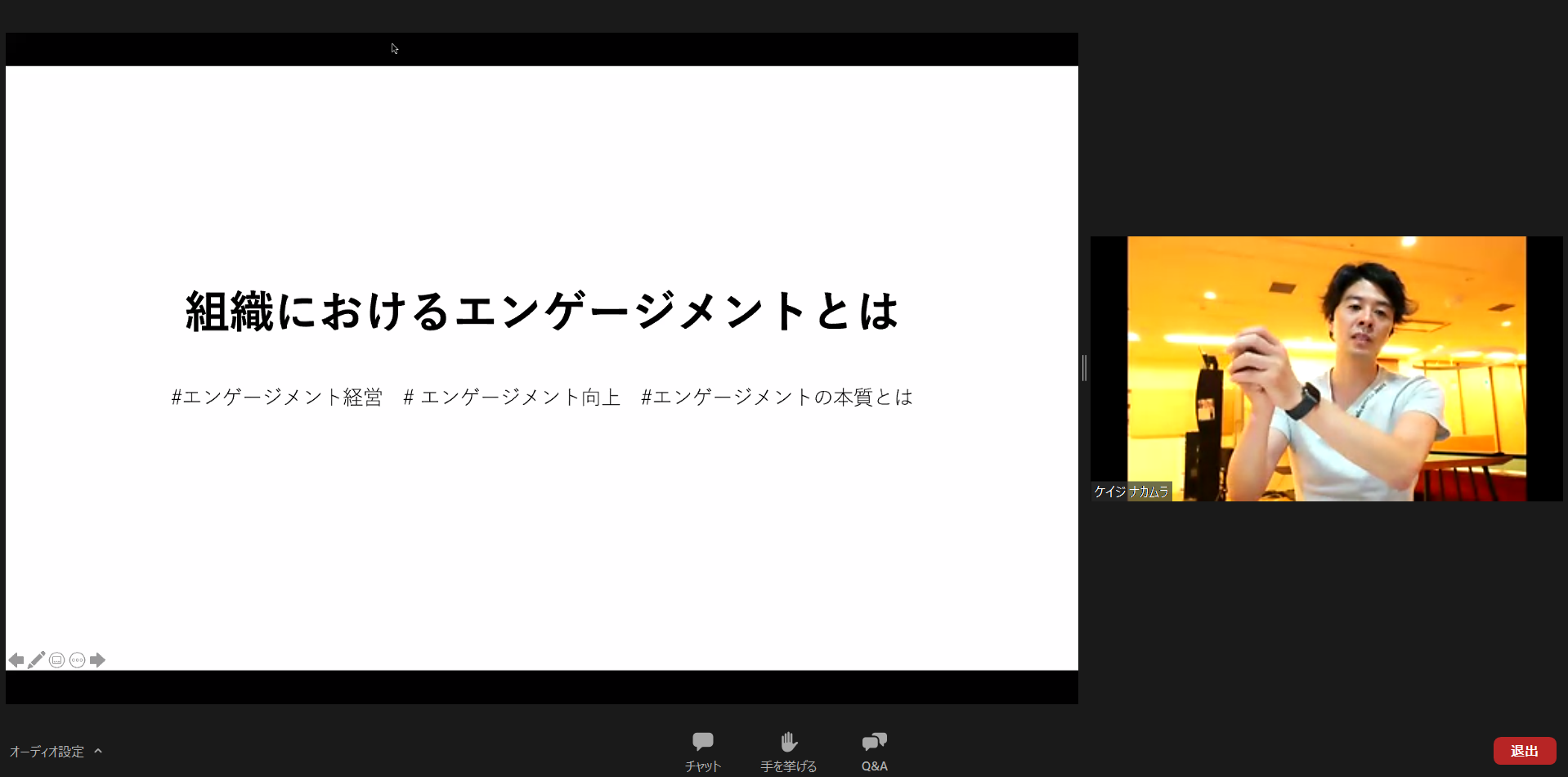2021/06/23 at Online seminar
Learning from Recruit how to build an autonomous organization
2021/06/23 at Online seminar
Learning from Recruit how to build an autonomous organization
-
Kaoru Fujii
Editor-in-Chief of HR, Recruit Co.
Chief Editor of HR. He is also the editor-in-chief of "Rikunabi NEXT".
Since joining Recruit Co. Since joining Recruit Co., Ltd. in 1988, he has been engaged in media production for the human resources business.
Served as Editor-in-Chief of TECH B-ing, Editor-in-Chief of Tech Soken, Editor-in-Chief of Entre, and Works Editor of Recruit Works Institute.
Concurrently works at Recruit's Management Competence Institute.
He is also a part-time lecturer at Digital Hollywood University, a visiting professor at the College of Information Management and Innovation, and a visiting faculty member at Chiba University. He has served as a member of the Ministry of Health, Labor and Welfare's Research Committee on Recruitment.
He is the author of "The Joy of Work: The Shape of the Future.
-
Keiji Nakamura
President of Colorkrew Corporation
In October 2010, he became the Representative Director of ISAO Corporation (now Colorkrew Corporation). In October 2010, he became President of ISAO Corporation (now Colorkrew Corporation). In order to make Colorkrew "a visionary company that makes the world's work fun", he himself became a member of Team Colorkrew. In order to make Colorkrew a "visionary company that makes the world's work fun", he is running the company as a member of Team Colorkrew.
In recent years, in this age of changing forms of management, emphasis has been placed on creating an organization in which each employee can work autonomously. What can we do to nurture highly engaged employees and expand their opportunities for success? Ltd., which is known as a "talent-producing company," invited Mr. Kaoru Fujii, Chief Editor of HR, to talk about the Recruit style of human resource management.

What is psychological management in recruiting?
- Nakamura
- In the early days of Recruit, a man named Takeshi Osawa explained in his book, "Psychological Management to Make Use of the Individual as He Is". Basically, the idea is that there is an "acceptance of the individual as he or she is" at the center, followed by an "autonomous expression of the individual" that envelops the acceptance, and finally leads to the "intentional creation of chaos" that embraces all of the above.
- Can you tell us what kind of intentions you had in putting this together, starting with individual acceptance?
- Fujii
- This is my personal interpretation, but I think that "psychological management" can be analogized to the ecosystem of grass and flowers. For example, it is impossible for a creature born in a haze to become a sunflower, and a creature born in a moss cannot become a tulip.
- I think it's important to look at the irreplaceable individuality of each person and polish it, rather than living someone else's life in order to live a vibrant life.
- In order to polish, accept, and manifest such individuality, it is important to have a management that is one outside and a culture that is the outermost. I understand that it is important to cultivate the soil, which is the chaos and culture, in order to provide good management (water, wind, and light) and good roots for the flowering of individuality, such as violet grass and tulips.
- Nakamura
- Does the company's system provide water and light to nurture the individual?
- Fujii
- I think this is an important element of human resource management, including systems and climate. It means that the individual can be expressed through various management methods, such as discretion and tolerance for failure.
- Nakamura
- What is it about the culture that encompasses them that can create chaos?
- Fujii
- That's right. Organizations inevitably create authority, and the center point shifts to the person with the power.
- In any case, if we break down authority and engage in honest dialogue in a heterogeneous group of people, the individual will emerge. The word "culture" comes from the Latin word meaning "to cultivate. I think it is very important to cultivate the soil itself and make it more and more heterogeneous and chaotic.
- Nakamura
- I am also influenced by Recruit's idea of not biasing authority, which I think is important.
- How exactly can we distribute authority and replace the soil?
- Fujii
- After all, culture is more important than systems. No matter how many systems you create, they will become a skeleton if there is no culture within the company, a foundation that is open and culturally solid.
- In the case of Recruit, we believe that management lies in daily conversations, and the phrase "What do you want to do" is symbolic. In English, we say, "Why are you here?" In response to a subordinate's question, "What should I do? The boss does not give an immediate answer to the subordinate's question, but instead asks back with a question-to-question, "What kind of proposal would you like to make to the customer?
- In the binary relationship between boss and subordinate, add a third term: solving the customer's problems. The vertical relationship of master-subordinate is combined with the horizontal relationship of the future of society and customers. I believe that a culture based on such daily conversations can open up the inward-looking authority to the outside world. I believe that this will foster a culture in which we can break down authority by looking toward the direction of the customer and toward the future society instead of making the relationship between the two of us a relationship between each other.
- Nakamura
- You have a creative way of having conversations.
- Fujii
-
In Mr. Ezoe's book, "The Genius of Entrepreneurship! (written by Yasuyuki Onishi, published by Toyo Keizai Inc. in February), Mr. Ezoe introduces how our company has "Bet on Passion/Respect for Individuals" as one of our core competencies and how we ask young people, "What would you do if you were me? In the book, it is introduced that the company's core competence is "Bet on Passion/Respect for Individuals" and that they ask young people "What would you do if you were me?
For example, when there are few hours left in the summer vacation and someone asks what to do with the homework, if the parent gives the answer, the homework will be completed as soon as possible, but the same dependency and obedience relationship will be repeated in the winter vacation. On the other hand, the question, "What would you do if you were me? On the other hand, asking the question "What would you do?" may seem to take a long time, but it will lead to the expression of an individual who is proactive, and in the medium to long term, it will lead to the growth of individuals and organizations that can run on their own.
- Nakamura
- I really sympathize with "Why are you here?", but isn't it a situation where newcomers suffer from not being taught their duties easily?
- Fujii
- Like when to take the auxiliary wheel off a bicycle, it is also important for supervisors and seniors to provide some support. Even if it is the first time for a child to go out for a ride, we cannot leave the child alone on the road. I think it is important to create guidelines and let them make their own decisions within those guidelines. .

What is Recruit's psychological management?
- Nakamura
- Colorkrew is a flat organization with no departments or positions, and from the outside it looks like a teal organization, but the people inside feel it's a macho organization.
- I think Recruit is similar in this respect, but I also think that Recruit has both aspects, such as providing a tough environment for young people, like a lion throwing a child off a cliff, and also supporting graduates to change jobs or start their own businesses.
- I'd like to ask how Recruit is balancing these factors.。
- Fujii
- There is a "Will Can Must Sheet" that is running around inside. While drawing out the "Will" of what I want to achieve in my current job, what kind of social impact I want to create in the future, and how I want to build my career, I also need to think about how far I want to take my current "Can" skills and competencies, and what "Must" I want to commit to during this half-year period. We have goals.
- Recent venture companies set high goals that are beyond the reach of normal efforts, such as OKRs and moonshots, and the same is true in recruiting.
-
In order to do this, we need to be aware of the question "Why are you here? For example, in the case of Hot Pepper Beauty, we need to be conscious of creating a society where people can make an appointment whenever they want to get their hair cut. If we let up, the inconveniences of Japan and the world will not be solved. When I think about the social impact and the purpose of my being here, I am strongly asked whether it is okay to have such a low goal. So, from a Jungian psychological point of view, there is a very paternalistic part of me.
> The paternalistic principle in Jungian psychology is to disconnect. This is a very important aspect of Jungian psychology. The maternal principle, on the other hand, is "inclusion. In contrast, the maternal principle is "embracing," which has two sides: one that nurtures and cares for the other, and the other that clings to and swallows the other. In this sense, I feel that today's recruiters have both the constructive aspect of paternity and the compassionate and nurturing aspect of motherhood.
- Nakamura
- I think we will all be expected to do what is required of the leader of such a business, but there are leaders and operational people in the business.
- Is it possible in a large organization like Recruit for everyone to think like a leader?
- Fujii
- I think there is such a thing as dedicated follower leadership, like a catcher who wants the pitcher to help him complete the game, as opposed to the so-called first penguin, the person who plunges in first and is called the leader.
- The follower-type leadership of those who prioritize so-called operational excellence can have an impact on the organization, so Recruit also evaluates and commends such areas.
- Nakamura
- The follower-type leadership of those who prioritize so-called operational excellence can have an impact on the organization, so Recruit also evaluates and commends such areas.
- Fujii
- This year, a company called Kakuichi won the Good Action Award, which was given to Colorkrew. It is a company that has been in business for 150 years with only a telephone and a fax machine. It was a very analog company, so much so that some of the employees asked, "Does Amazon mean a river? Once we started using Slack to share information with everyone, each and every one of us became very autonomous and self-motivated. I heard that the age hierarchy disappeared as veterans who had a lot of information and wisdom taught younger people and younger people taught veterans. When information is shared transparently, each person makes decisions autonomously and the entire organization works together in a self-propelled manner. Transparency, ownership, and autonomy. Everything works together, and information empowers the organization is a very good example.
- Nakamura
- Sharing information can be difficult for those in higher positions, as they feel like the source of their power is being leaked to everyone else.
- However, the example of Kakuichi shows that once you start doing this, the power of the team increases dramatically. I think that organizations that are allergic to sharing information, as we are, would be interested in looking at examples of how much team strength can be achieved by sharing information.
- On the contrary, what does motherhood mean to you, Recruit?
- Fujii
- This is my own story, but when I was working as a mid-career sales representative at the Ikebukuro sales office, there was a time when I achieved the sales target for each quarter.
- At that time, one of my seniors who was about three years older than me said to me, "The way Fujii moved in the last month was not like Fujii at all. Are you okay with that? He was furious with me.
- From the outside, Fujii seems to be very demanding and paternalistic, but on the other hand, I also feel that he was maternal in the sense that he lovingly scolded me for not making the most of my strengths.
- In terms of external strictness and strictness in the sense of nurturing me internally, I think that the voice of my senior colleague was very maternal in the sense that she was thinking about me internally.

What is Engagement in Organizations?
- Nakamura
- Engagement is a bit of a buzzword, so I'd like to start with what engagement is.
- The simple image is that of a connection, but I think engagement in a company or organization is different from just being connected.
- What do you think about this, Fujii?
- Fujii
- I am also a self-proclaimed "Kanji Uncle," so when I come across such foreign words in English, I try to trace their true meaning by converting them into kanji.
- Engagement looks like a "knot" in that sense. A marriage engagement ring is a wedding band. It has the word "ketsu" or "tie" in it, and that word "musu" has two meanings. One is the very connective "musu," but the other is "musu," which means to give birth.
- When we are moving toward a great performace that we cannot achieve alone, it is still not enough to simply be good friends. I think that producing new value from the connection, what both parties are trying to produce toward contribution is also included in the engagement.
- Nakamura
- In that sense, do you think that if we continue to connect with the goal of also connecting and producing value, we will become better as an organization?
- Fujii
- Yes, I agree. Japanese rugby, which was so exciting before Corona, is a good example. It was a really diverse group of people who came together and engaged as one team. I think they tried to surprise the world with fantastic play in a way that they had never done before in the history of Japanese rugby, and they produced new values, creative play and results.
- In order to achieve that kind of engagement, Each person must be dedicated to the team, to the team. I think that by dedicating themselves to the team and properly revealing their own strengths, the organization will be engaged in a good way.
- Nakamura
- Returning to the relationship between the organization and the individual, Japanese companies value the attitude of "harmony is the key to success," and harmony takes precedence in some areas.
- That goes along with the idea of hierarchy, and I think there are situations where the lack of individual assertions can lead to stagnation, but what kind of balance should be struck?
- Fujii
- In my opinion, there are two meanings to the Chinese character for "Wa" in the phrase "Wa wo tsuite kii desu". One is to create a relationship that will not be disturbed, and the other is to "waeru". Like the seven gods of good fortune, the power comes from having different gods on the same boat. The meaning of the Seven Gods of Good Fortune is that although they are in control, each one of them has a different opinion, which will ultimately lead to business prosperity. I think that Japan needs to learn more about assertive communication that respects the other person and does not discourage them. .
- Nakamura
- It's about saying what you want to say. Assertiveness is also a key word at Colorkrew. Respect, but don't discourage. I thought these two keywords were good points to pay attention to.
- In large organizations, I have often seen cases where the younger generation, who know about the new technology, cannot say anything to the higher-ups with decision-making authority who are clearly saying the wrong thing.
- I think there are many companies in Japan where the whole company is like that, but what is it like at Recruit?
- Fujii
- It is said that when we are in anti-authoritarianism, we say Let's and Try more often than Must and Should in our daily conversations, resulting in higher organizational activity and broken authority. It would be good if supervisors do not say "should" or "must," but encourage them to consciously speak the words Let's and Try in the daily conversation of the organization.
- On the other hand, young people are good at talking factually, citing customers' stories. "They will bring up examples from the U.S. or Europe, or data from the U.S. stock exchange, and say, "Isn't this bad for recruiting? "Isn't this bad for recruiting?
- Nakamura
- What do you do when a young person won't open his or her mouth?
- Fujii
- In our weekly group meetings, we play a game where we all try to string words together and spin them around like a traditional renga. "After the supermarket, when we were at the shopping mall, a raccoon came out and we ate curry and rice for a year, and so on. In this way, all of us can participate and create an atmosphere where when we work together, creativity that no one would have imagined is born.
- Nakamura
- You give them an experience that has nothing to do with work, but is interesting to do as a team.
- Fujii
- This is also a story of transformation that I learned from a book by Satya Nadella, the third president of Microsoft, who invited an expert in mindfulness training to spend one Friday training members of the executive management class who had not yet established trust with each other.
- And when we share our human existence with each other by disclosing our childhood roots and life perspectives to each other, we come to recognize that we are not rivals who are competing against each other, but fellow human beings with similar hurts and sufferings, and that we are indispensable to each other for the realization of a higher mission.
- This will change the organization from one that gathers for efficiency to one that gathers for presence. Existence is a very important thing.
- Nakamura
- I had a few images in my mind of what I would like to have those two do in our company (laughs).
Summary
In this issue, we hear from Kaoru Fujii, General Editor of Recruit HR Co., Ltd. about creating an organization that nurtures the power of the individual. It seems that authority is the key to management for technological innovation and the creation of new value. Following Recruit's example of assertiveness will be the first step in creating an autonomous organizational structure.
